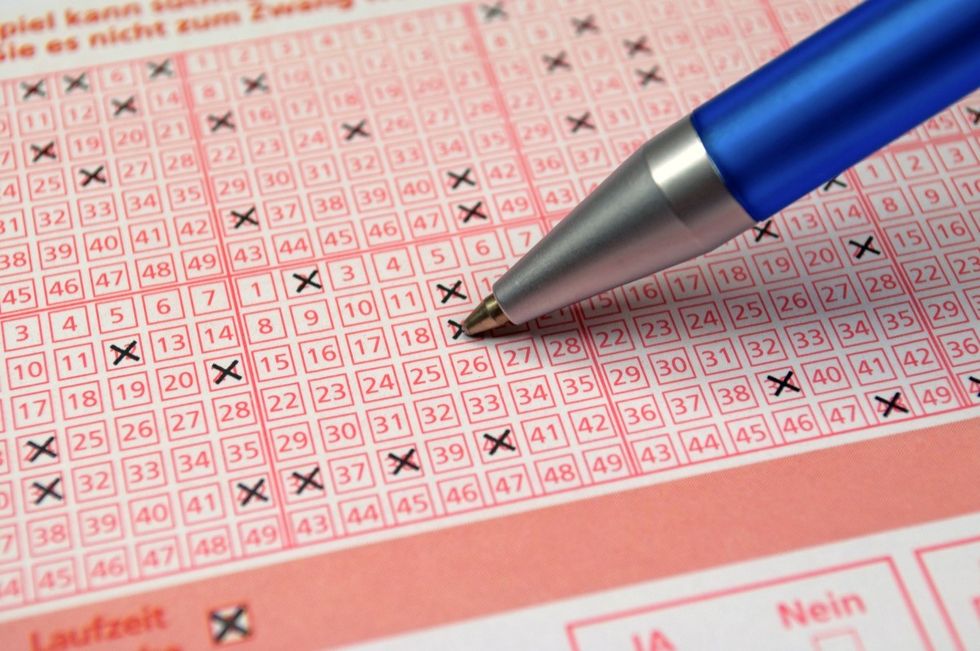Many people dream of winning the lottery, but what are really the chances? Most won’t win, but players still can’t resist the thought of beating the odds. Around 181 million people play annually, and the chances of winning are 1 in 292.2 million, per Search Logistics, but the payouts can be millions for a few lucky ones. The next Powerball drawing is today, October 2nd, and $275 million is up for grabs. According to Jared James, a former PriceWaterhouseCoopers CPA and founder of Lotto Edge, there’s no proven strategy for winning. Instead, “it’s best to treat the lottery as a fun form of entertainment and play with that mindset,” he says. However, there are ways to increase your chances. Read on.
RELATED: 7 Biggest Mistakes Lottery Winners Make.
Don’t Use Numeral Patterns
Shutterstock
Powerball is a game of luck, and there’s no real science behind winning; however, you can help boost your chances. James has analyzed 16 years of historical Powerball drawings and made a few observations.
The first way to swing the odds in your favor is to select numbers from the entire play slip. “Some players limit their selections to only birthdays and anniversaries, which leads to picking numbers that only fall within the 1-31 range,” James explains. “However, all five white balls falling solely in that range occur only about 3% of the time.”
Next, avoid using a numeral pattern like 3, 13, 23, 33, 43. “ Winning numbers don’t follow patterns,” James says. He also suggests mixing even and off numbers. “The most frequent combinations featured a mix of even and odd numbers. The optimal mix was either three even and two odd or two even and three odd, which occurred in about 64% of winning results.”
In addition, James explains, “The sum of the five white balls was in the range of 101 to 200, about 70% of the winning results.”
The Odds are Not in Your Favor
Shutterstock
Powerball is a fun game that can’t be taken too seriously. James says, “The odds of being attacked by a shark are 1 in 3,750,000. With the Powerball, you are trading astronomical odds for a chance at a massive mega jackpot.”
However, he explains, “We always encourage players to pick instead a prize that would make a difference in their life, keeping in mind the smaller the better. Would winning $10,000 make a difference? How about $1MM? Hitting $1MM on a scratch-off ticket would change your life and has much better odds than winning the Powerball.”
Powerball Varies From State to State
Shutterstock
Powerball is currently in 45 states, and while the basics of the game are the same, there are different features. “The first is Power Play, where for an additional $1 per play, players can multiply non-jackpot winnings by 2, 3, 4, 5, or 10 times,” says James. “There is a cap of $2MM for Power Play Prizes,” he adds.
The second feature that can differ between states is Double Play. James explains, “For an additional $1 per play, players can choose the Double Play option and have a second chance to match their same Powerball numbers in an additional drawing conducted immediately after the Powerball drawing. Winning the top prize in the Double Play has the same odds as the original drawing; however, the top prize is capped at $10MM.”
If You Win, Get a Lawyer
Shutterstock
If the event that you do win Powerball, don’t blast the news on social media. “The first thing you should do is keep quiet,” James states. Instead, he says, “Let the win sink and contact a qualified lawyer to help you navigate winning a life-changing prize.”
You should also find an attorney quickly who can help “claim your winnings anonymously and provide some initial guidance on getting ready for a massive life change,” James explains.
Only Spend What You Can Afford to Lose
Shutterstock
The jackpot for Powerball can be massive, and whoever wins will be set for life, but that doesn’t mean you should bet your entire savings.
“Only play what you can afford to lose,” James recommends. “Big Powerball jackpots happen with increasing frequency, and the odds remain extremely difficult,” he adds. “ Don’t be tempted by billion dollar jackpots and risk more money than you can afford to lose. Always have a budget and stick with it.”
In addition, James suggests that you “always double-check your numbers. Lots of winning tickets go unclaimed when people misread the results.”





